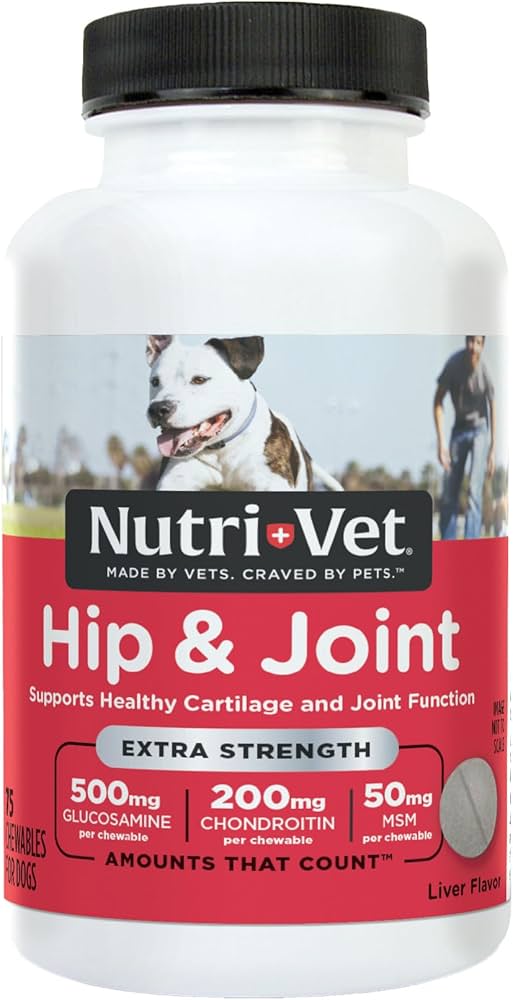Observing your dog’s daily behavior is key to determining if they might benefit from joint supplements. Look for signs like stiffness, difficulty rising or lying down, hesitation to jump or use stairs, and a general decrease in activity. These indicators can suggest joint discomfort or arthritis, conditions that specialized supplements aim to alleviate. If you notice these changes, a consultation with your veterinarian is essential. They can accurately assess your dog’s condition and recommend appropriate supplements as part of a comprehensive health plan.
Understanding Glucosamine and Arthritis Medications
Glucosamine is a common ingredient in joint supplements for dogs and is generally considered safe. However, some dogs may experience gastrointestinal side effects such as diarrhea, vomiting, or constipation. To minimize these risks, it’s crucial to follow the recommended dosages provided by the manufacturer or your veterinarian. Always consult your vet before starting glucosamine, especially if your dog has pre-existing health conditions or is on other medications.
Similarly, arthritis medications, particularly NSAIDs, can be effective but may also cause side effects. Common issues include gastrointestinal problems like vomiting, diarrhea, and ulcers, with less common but more serious effects on the liver or kidneys. Close veterinary monitoring is vital to manage these medications, including regular check-ups to adjust treatment plans and potentially balance NSAIDs with anti-inflammatory supplements.
Potential Side Effects of Joint Supplements
While joint supplements are typically well-tolerated, some dogs may experience side effects. Gastrointestinal upset, such as diarrhea, vomiting, or constipation, is the most common, often occurring when a supplement is first introduced or if the dosage is incorrect. Allergic reactions, though rare, can also occur, ranging from mild skin irritation to more severe responses. Adhering to recommended dosages and consulting your veterinarian before starting any new supplement regimen are crucial steps to prevent adverse effects and ensure the supplement is suitable for your dog.
The Risks of Over-Supplementation
Administering too much of a joint supplement can indeed be harmful to dogs. Overdosing can lead to gastrointestinal issues like diarrhea, vomiting, or constipation. In rarer cases, excessive doses might trigger allergic reactions or other health complications. To prevent these adverse effects, strictly follow the dosage guidelines from the supplement manufacturer or your veterinarian. Always consult your vet before adjusting any dosage to ensure it remains within a safe range.
Key Ingredients for Effective Joint Supplements
The effectiveness of joint supplements varies by individual dog. Commonly effective ingredients include glucosamine, chondroitin, MSM (methylsulfonylmethane), and omega-3 fatty acids, all known for their ability to support joint health and reduce inflammation, thereby improving mobility and comfort.
The Role of Healthy Cartilage
Healthy cartilage is a vital buffer between bones in a joint, preventing bone-on-bone friction and enabling smooth movement. It plays a critical role in weight distribution and shock absorption during activity.
Impact of Cartilage Deterioration
When cartilage deteriorates due to age, injury, or disease, friction increases, and shock absorption decreases. This leads to pain, stiffness, and reduced mobility, significantly impacting a dog’s quality of life and ability to perform daily activities.
Common Joint Diseases in Dogs
Two of the most common joint diseases in dogs are hip dysplasia and arthritis. Hip dysplasia is a genetic condition affecting the hip socket, leading to instability and arthritis. Arthritis is the inflammation of joints, which can stem from wear and tear, autoimmune disorders, or complications from other joint abnormalities.
Certain breeds are predisposed to these conditions. Larger breeds like German Shepherds and Labrador Retrievers are prone to hip dysplasia, while smaller breeds may experience patellar luxation. Genetic predisposition highlights the importance of early screening and preventative care.
Benefits of Chondroitin and Other Joint-Supporting Supplements
Chondroitin sulfate is a fundamental component of healthy cartilage, crucial for maintaining joint flexibility, cushioning, and protection, especially for active, aging, or joint-problem-prone dogs.
Key Benefits of Chondroitin:
- Elasticity and Flexibility: Supports the spongy structure of cartilage, enabling it to withstand daily stress.
- Shock Absorption: Enhances the cartilage’s ability to absorb impact, reducing pain and injury risk.
- Synergistic Effects: When combined with glucosamine and MSM, chondroitin’s benefits are amplified, working together to reduce inflammation, improve lubrication, and promote cartilage repair.
Complementary Supplements for Enhanced Joint Health
Other beneficial nutrients that complement chondroitin include:
- Omega-3 Fatty Acids: EPA and DHA are potent anti-inflammatories that reduce swelling and support joint function.
- Amino Acids: Essential for rebuilding and maintaining joint tissues, aiding in repair and long-term structural support.
- Sodium Chondroitin Sulfate: Known for its pain-reducing and anti-inflammatory properties, helping maintain cartilage integrity.
CBD for Pain Relief and Mobility
CBD (cannabidiol) is increasingly used for managing chronic joint pain and inflammation, often without the side effects of conventional medications. Its potential benefits include pain management, inflammation control, and enhanced mobility by reducing discomfort and stiffness.
Important Note: Always consult your veterinarian before introducing CBD or any new supplement. They can confirm the correct dosage, check for potential interactions, and ensure it’s appropriate for your dog’s specific health needs.
Comprehensive Joint Care Strategy
Combining chondroitin sulfate with complementary supplements like omega-3s, amino acids, and potentially CBD offers a holistic approach to joint care. This combination helps protect cartilage, reduce inflammation, manage pain, and improve mobility, supporting your dog’s active and comfortable life at every stage.

